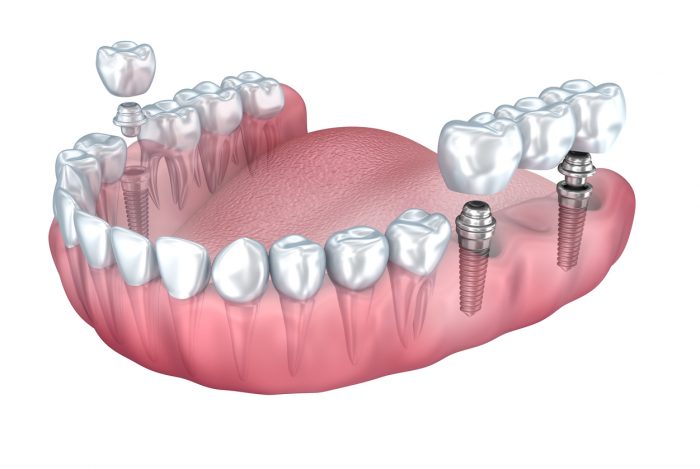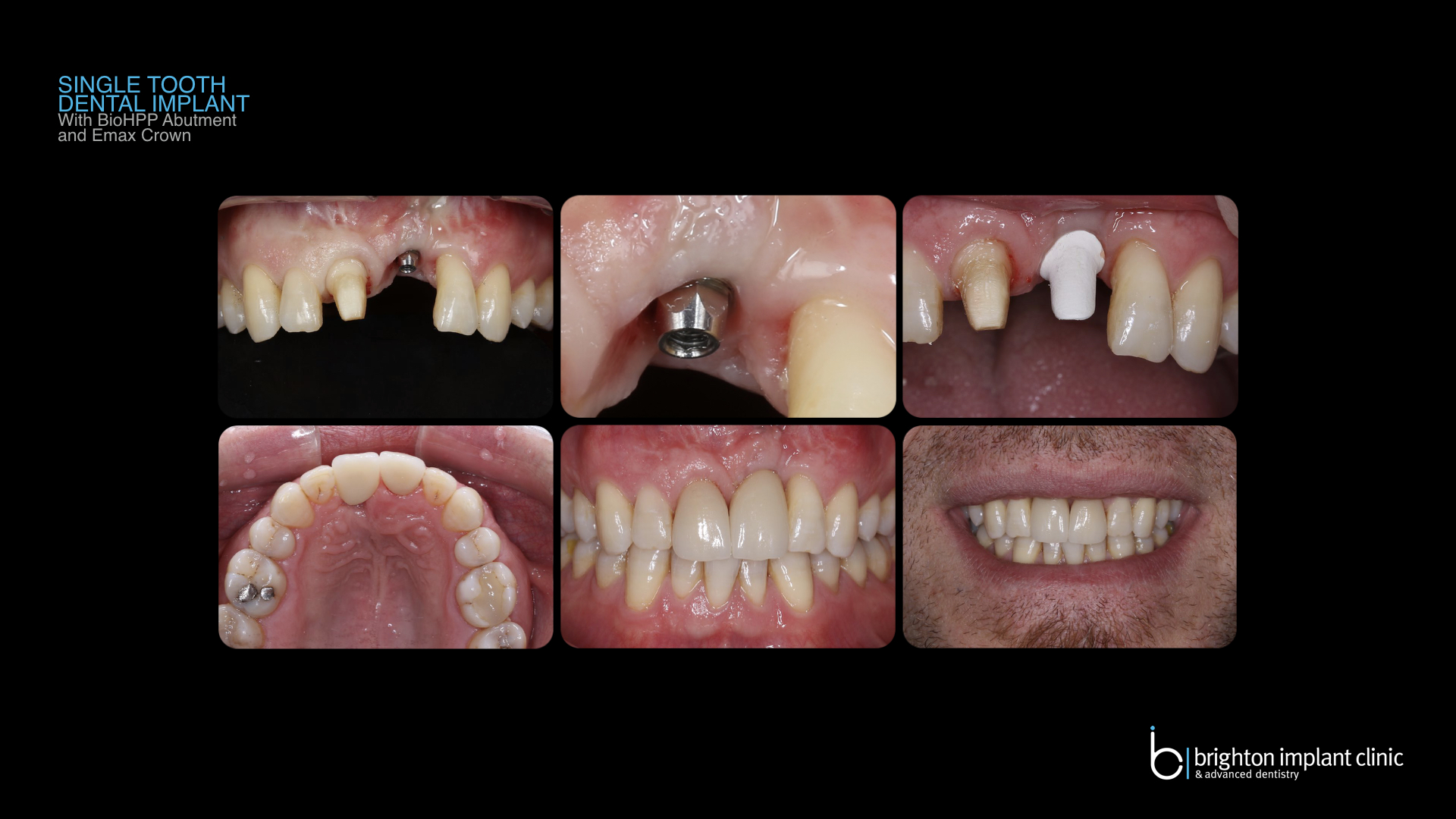
Dental Implants were actually first invented in 1952 by a Swedish physician called Per-Ingrva Branemark who was coined the ‘father of modern implantology’. Today, modern dental implant surgery is the most advanced and sophisticated procedure for replacing missing teeth.
A dental implant is a biocompatible surgical fixture, which is inserted into the jawbone, which creates a bond to the bone like that of a natural tooth. This implant or ‘artificial tooth root’ is then fitted with a crown or bridge, which looks as well as feels like a natural tooth. With the advancements in clinical materials as well as dental technique, dental implant surgery now has an average of a 95% success rate.

Dental implant treatment is usually always performed under local anaesthetic. In addition to this, some patients choose to have I.V. sedation to relax and feel more comfortable throughout the procedure. The surgery can take as little as an hour for 1 dental implant to several hours when placing multiple implants such as in the all on four procedure. Following surgery, it is normal for a patient to experience some discomfort, swelling and minor bleeding.
Any type of surgery does pose a risk, and dental implant treatment is no exception to this rule. Risks in dental implant treatment are very rare and in most cases, minor and easily treatable.
Other potential complications of dental implant treatment also includes…
Infection
As with any invasive procedure, there is a risk of infection. An infection at the implant site is called peri-implantitis. This can be easily diagnosed through a dental examination and depending on the severity, infections are usually easily treatable too. Treatment options may include anti-bacterial mouthwash, antibiotics, or deep cleaning of the infected area. In the case that the infection does not respond to treatment for any reason, the implant will most likely be removed. The procedure could then be carried out again once this area had fully healed.
Injury or Damage
As in incision is made into the gums for the implant to be placed, there is a risk of damage to tissue, other teeth or blood vessels in doing so. However, this is extremely rare, as, before any dental implant treatment, a patient should have a CT scan. A CT scan is a 3D dimensional x-ray, which shows dental structures, soft tissues, nerve paths and bone in the craniofacial region. This enables dental surgeons the ability to precisely plan treatment.
Nerve Damage
Nerve damage can cause pain, numbness or tingling in the teeth, gums, lips or chin. During dental implant treatment, there is a risk of nerve damage, although, it is extremely rare and rarer still that it would lead to any permanent damage. The risk of nerve damage in dental implant treatment is around 1%. Dental surgeons use x-ray radiographs and CT scans which help them to plan accurately the position of implants and minimise nerve damage.
Sinusitis
Sinus problems or sinusitis can occur because of dental implant treatment in the upper jaw. The size and position of everyone’s sinuses are different and other factors such as bone loss can affect the positioning and type of implant used. There are preventive measures such as bone grafts, sinus lifts or using zygomatic implants to reduce risk. If a patient does have sinus problems after dental implant treatment in most cases this can be treated.
Dental Implant Failure
With dental implant treatment, there is a risk that it could fail. The most common reasons for a dental implant to fail is because of smoking, poor oral hygiene or a pre-existing condition. When a dental implant fails, this means it has not healed or fused to the bone. If this does occur, the procedure can be attempted again once the failed implant has been removed and the area has fully healed. In some extreme cases, where implants have failed, insufficient bone may be left which would prevent future implant placement.
Dental Implant Stresses
Dental implants need a sufficient time to heal and this is why dental implants are fitted with either a provisional crown or alternatively a removable appliance so that the gums and bone can properly heal. Applying force to dental implants when they have not had a sufficient time to heal such as through biting or chewing can cause an implant to fail. An experienced dental surgeon will always examine through x – rays to determine if the implant is ready to withstand biting force. However, this is not always 100 % and there is a small risk that force at the beginning stages of treatment can cause an implant to dislodge.
Incorrect Implant Position
Careful planning is needed when placing a dental implant. If several teeth are missing, the implants need to be placed in precise positions to facilitate making final implant crowns or bridges. If an implant is not placed in the correct position then the final crown or bridge can look and function incorrectly. Poor aesthetics and food trapping around the final implant restoration can occur as a result of poor implant positioning.

How to avoid implant treatment complications
COMPREHENSIVE & THOROUGH ASSESSMENT
Make sure that you opt to have a reputable and experienced dentist to carry out your dental implant treatment. Ask your dentist what the risks are in regards to your particular implant treatment. Your dentist will use standard radiographs, panoramic radiographs and ct scans to accurately plan your dental implant surgery.
DETAILED IMPLANT TREATMENT PLAN
Before taking any decision to have dental implant treatment you should have a detailed treatment plan prepared by your dentist. The treatment plan should cover all aspects of the treatment, the risks and potential complications of treatment. The number of appointments and the cost of treatment should be clearly laid out for the patient to consider. The guarantee policy should also be considered given that dental implants do sometimes fail.
FOLLOW INSTRUCTIONS & ORAL HYGIENE
Within your treatment plan, the dentist will highlight what will contribute to implant success. Good oral hygiene and no smoking are both very important factors to ensure implant integration and long-term implant survival. After dental implant surgery, it is important to follow the postoperative instructions set by the clinic.

The Brighton Implant Clinic
We are proud to say that we are renowned for our success in complex cases of dental implantology. Dr. Bruno and the team have years of experience in dental implant treatment and have achieved outstanding results as well as awards for patient restorations. Our services include the all-on-four procedure, teeth-in-a-day, zygomatic implants, sinus lifts, bone grafts and more.
Find out more information about dental implant treatment.
See our patient cases.

